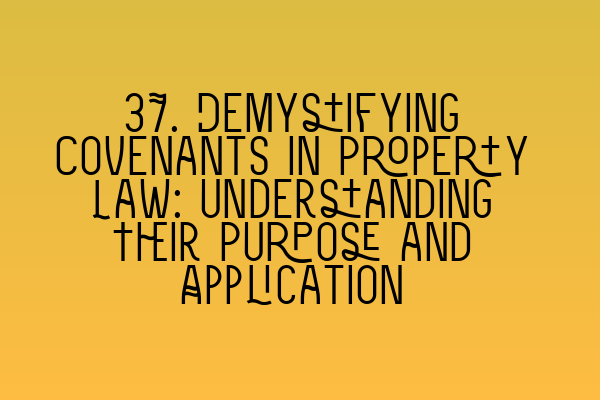Demystifying Covenants in Property Law: Understanding Their Purpose and Application
Property law can be complex and filled with legal jargon that can confuse even the most experienced professionals. One area that often causes confusion is covenants. Covenants are legally binding agreements that dictate certain obligations and restrictions on the use of a property. Understanding the purpose and application of covenants is essential for property owners, buyers, and developers alike.
What Are Covenants?
Covenants are legally enforceable promises made between parties involved in a property transaction. They can be found in various property documents, such as deeds, leases, and contracts. Covenants impose restrictions or obligations on the use of the property, ensuring that certain conditions are met.
Covenants can be classified into two broad categories: affirmative covenants and restrictive covenants. Affirmative covenants require the property owner to perform certain actions, while restrictive covenants prohibit specific activities or uses of the property.
The Purpose of Covenants
The purpose of covenants is to ensure that property owners adhere to agreed-upon conditions and restrictions. Covenants serve several important purposes:
- Maintaining Property Values: Restrictive covenants are often used in residential developments to maintain the uniformity and aesthetics of the neighborhood. They can include restrictions on exterior alterations, signage, or even the type of vegetation allowed.
- Protecting the Rights of Parties: Covenants can protect the rights of both the property owner and their neighbors. For example, an affirmative covenant may require a property owner to maintain a fence, ensuring privacy for both parties.
- Promoting Environmental Responsibility: Covenants can also be used to promote environmental responsibility by prohibiting certain activities that may harm the environment, such as the use of harmful chemicals or the improper disposal of waste.
- Preserving Historical or Architectural Features: In historic districts or areas with architectural significance, covenants may be used to preserve and protect the historical or architectural features of the properties.
It is important to note that covenants are legally binding and can have significant consequences if breached. Violating a covenant can result in legal action and financial penalties.
Enforcing Covenants
Enforcing covenants requires taking legal action, typically through the courts. Those seeking to enforce a covenant must demonstrate that the covenant exists, that it has been breached, and that they have suffered harm as a result of the breach.
When purchasing a property, it is crucial to conduct proper due diligence to identify any existing covenants. Engaging a qualified property solicitor can help ensure that all relevant covenants are discovered and understood before purchasing a property.
Conclusion
Understanding covenants in property law is crucial for all parties involved in property transactions. Covenants serve an important purpose in maintaining property values, protecting rights, promoting responsibility, and preserving historical or architectural features.
If you are preparing for the SQE 1 or SQE 2 exams or looking for practice exams and preparation courses, SQE Property Law & Land Law can provide you with the resources you need:
- SQE 1 Practice Exam Questions
- SQE 1 Practice Mocks FLK1 FLK2
- SQE 2 Preparation Courses
- SQE 1 Preparation Courses
- SRA SQE Exam Dates
By equipping yourself with the necessary knowledge and resources, you can confidently navigate the intricacies of property law.
